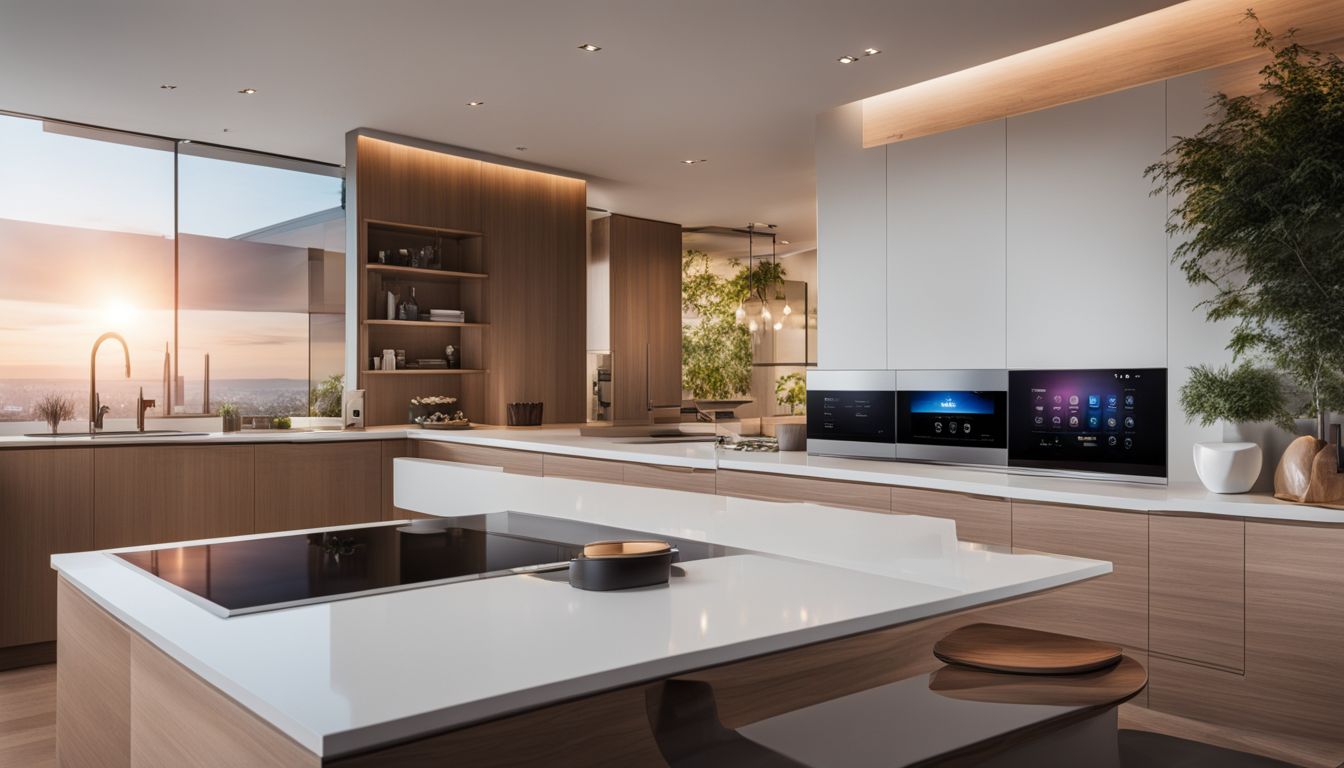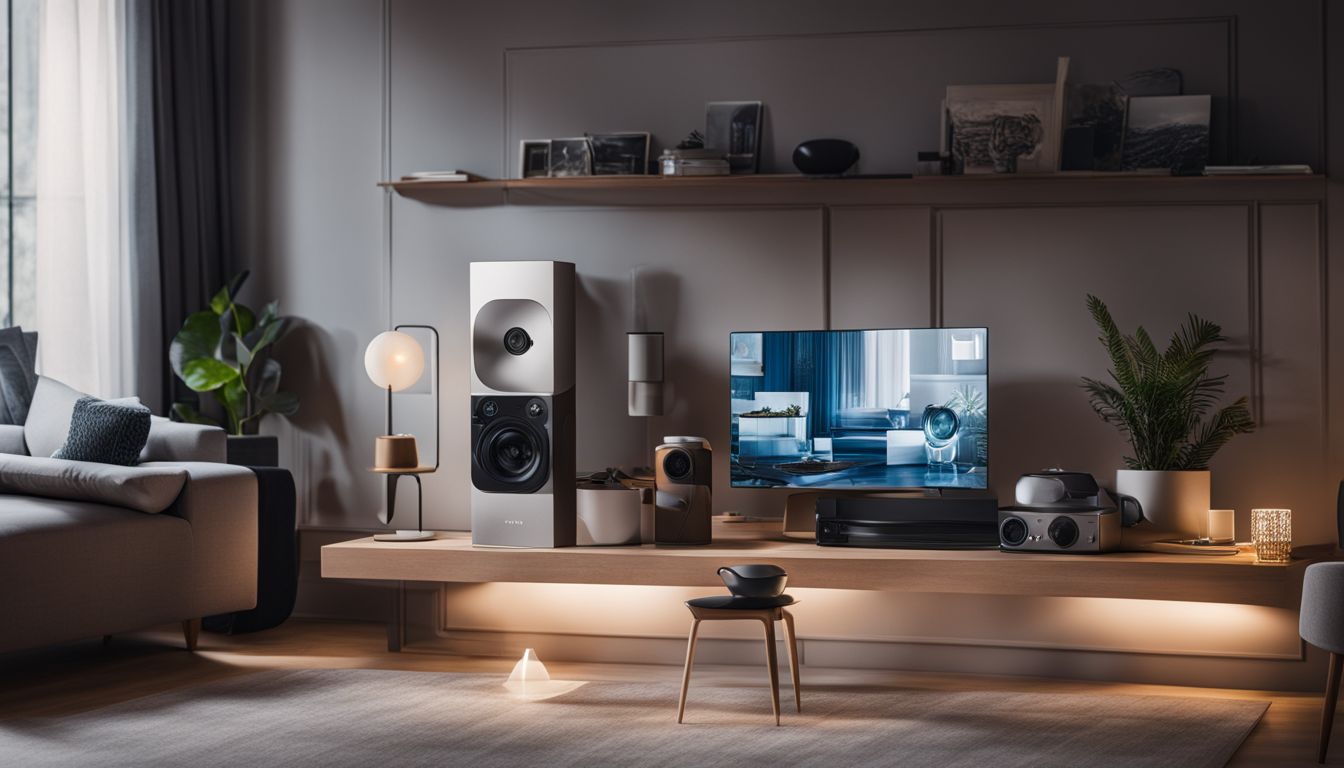Exploring the Pros and Cons: Is Smart Home Technology Worth It?
Discovering the perfect balance of comfort, efficiency, and technology in the home can be a daunting task. With the rise of the Internet of Things (IoT), smart home technology is becoming increasingly prevalent.
This blog post will guide you through both pros and cons of investing in smart home automation – everything from convenience to security risks. So are you ready to explore if this high-tech upgrade worth its cost? Let’s dive right in!
Key Takeaways
- Smart home technology offers convenience and automation, allowing homeowners to control various aspects of their homes with ease.
- Smart homes can help save energy and lower costs by automating tasks, optimizing resource usage, and providing real-time insights into energy consumption.
- Enhanced security features in smart homes provide continuous monitoring, real – time alerts, and remote control capabilities for added peace of mind.
- However, there are considerations such as the cost of installation and equipment, privacy concerns, compatibility challenges, and potential dependence on technology that should be evaluated before investing in smart home technology.
Pros of Smart Home Technology

Convenience and automation

Smart homes make life easy. They do the hard work for you. You can use a phone or tablet to control stuff in your home from anywhere. Turn on lights, lock doors, and even start coffee with just a tap.
It’s like having a helper at home all the time. With automation, things happen on their own at set times. Like lights turning off when it’s bedtime! This makes daily tasks super simple to manage.
Energy efficiency and cost savings

Smart home technology offers significant benefits in terms of energy efficiency and cost savings. By automating tasks and controlling devices remotely, smart homes optimize the use of energy resources.
This means that appliances and lights can be turned off when not in use, resulting in lower electricity bills. Moreover, smart thermostats allow homeowners to schedule temperature adjustments based on their needs, minimizing energy waste.
In addition to reducing utility costs, smart home technology also helps users save money by improving overall efficiency. For example, sensors can detect when a room is empty and adjust lighting accordingly.
Smart appliances can operate during off-peak hours when electricity rates are lower. These small adjustments add up over time, leading to significant savings.
By monitoring energy usage patterns and providing real-time insights into consumption habits, smart home systems empower homeowners to make informed decisions about their energy usage.
With this information at hand, they can identify areas where wastage is occurring and take steps to rectify it.
Enhanced security and safety

Smart home technology offers enhanced security and safety for homeowners. By connecting to various devices, such as door locks, security cameras, and motion sensors, smart homes can provide continuous monitoring and real-time alerts.
For example, if there’s suspicious activity detected outside your home or an unauthorized entry attempt, you’ll receive an instant notification on your smartphone. Additionally, you can remotely control locks and surveillance systems to ensure your home is safe even when you’re away.
With these features, smart homes offer peace of mind knowing that you have greater control over the security of your property.
Improved comfort and control
Smart home technology offers improved comfort and control for homeowners. With smart devices, you can easily adjust the temperature in your home to suit your preferences, ensuring a comfortable environment at all times.
Additionally, you can automate tasks such as turning on lights or closing curtains, making it more convenient and effortless. Having remote access to your appliances and systems gives you greater control over your home, allowing you to manage everything from security cameras to door locks with just a few taps on your smartphone.
This level of convenience and control enhances the overall living experience in a smart home setting.
Cons of Smart Home Technology
One of the cons of smart home technology is the cost of installation and equipment. Not only do you have to invest in the devices themselves, but also in professional installation if necessary.
However, despite this initial cost, many find that the long-term benefits outweigh the upfront expenses. Want to know more about other drawbacks? Keep reading!
Cost of installation and equipment

Installing smart home technology can come with a significant cost. You’ll need to factor in the expenses for purchasing the necessary equipment and paying for professional installation if required.
Smart home devices like thermostats, security cameras, and voice assistants can be quite expensive upfront. However, it’s essential to consider the long-term benefits they provide.
Smart homes are designed to save you money on energy bills through increased energy efficiency. Additionally, some utility companies offer rebates or incentives that can help offset the initial investment costs.
Privacy and data security concerns

Smart home technology offers numerous benefits, but it also raises concerns about privacy and data security. With the increasing number of connected devices in a smart home, there is potential for personal information to be exposed or intercepted by hackers.
Additionally, some people worry that smart home systems could collect and store sensitive data about their daily routines and habits. This has led to an increased need for robust privacy measures and secure networks to protect against unauthorized access or misuse of personal information.
While manufacturers are implementing encryption protocols and security features, it is essential for users to remain vigilant by regularly updating passwords, using strong authentication methods, and carefully reviewing privacy settings on their devices.
Compatibility and integration challenges

Smart home technology faces compatibility and integration challenges. Different manufacturers develop distinct systems, making it difficult to connect and integrate new devices with existing ones.
This can be frustrating for homeowners who want to expand their smart home capabilities or upgrade their devices. It requires careful research and consideration of compatibility requirements before investing in any new equipment.
Dependence on technology and potential issues

Smart home technology offers many benefits, but it also comes with a potential downside. One issue to consider is the dependence on technology. Smart homes rely on internet connectivity and automated systems to function correctly.
If there is a power outage or internet connection problem, some features may not work properly. Additionally, as smart technology evolves, older devices may become outdated and no longer supported by manufacturers.
This can lead to compatibility issues and the need for frequent upgrades or replacements. It’s important to be aware of these potential challenges before investing in smart home technology.
Considerations Before Investing in Smart Home Technology

Before making the decision to invest in smart home technology, it is important to assess your needs and priorities, research and compare different options, budget for installation and maintenance costs, and understand the privacy and security measures that are in place.
Assessing your needs and priorities

To determine if smart home technology is worth investing in, it is important to assess your needs and priorities. Consider the following:
- Identify your main goals: Think about what you want to achieve with smart home technology. Do you prioritize convenience, energy efficiency, security, or all of these?
- Evaluate your lifestyle: Consider your daily routines and habits. Are there specific tasks or activities that could be automated or made more efficient with smart home devices?
- Determine your budget: Set a realistic budget for smart home technology installation and equipment costs. Research different options and compare prices to find the best fit for your budget.
- Assess compatibility with existing devices: Take into account the devices you already own and use regularly. Check if they are compatible with the smart home system you are considering, as this will impact integration and ease of use.
- Consider privacy and security measures: Understand the privacy policies of the smart home technology you are interested in. Look for features like end-to-end encryption and strong authentication methods to ensure data security.
- Plan for future scalability: Think about whether you may want to expand your smart home system in the future. Look for technologies that allow for easy integration of new devices as your needs change over time.
Researching and comparing options

To make sure you choose the right smart home technology for your needs, it’s important to research and compare your options. Here are some things to consider:
- Assess your needs: Think about what specific features and functions you want in your smart home system. Consider factors like convenience, energy efficiency, security, and automation.
- Browse different brands and products: Look into different manufacturers and the smart home products they offer. Compare their features, compatibility with other devices, and user reviews to find the best fit for you.
- Read customer feedback: Take the time to read customer reviews and testimonials on websites or forums. This can give you insights into real-life experiences with different smart home systems.
- Seek professional advice: If you’re unsure about which smart home technology is right for you, consult with professionals who specialize in this area. They can offer expert advice based on your specific requirements and budget.
- Visit showrooms or attend trade shows: Check if there are any local showrooms or trade shows where you can see different smart home technologies in action. This can help you get a better understanding of how they work and their potential benefits.
Budgeting and planning for installation and maintenance costs

Planning and budgeting for the installation and maintenance costs of smart home technology is essential. Here are some important factors to consider:
- Cost of equipment: Smart home devices can vary greatly in price, from affordable options to more expensive high-end models. Research different brands and models to find ones that fit your budget.
- Installation expenses: Depending on the complexity of the system and your needs, you may need professional help with installing the devices. Consider including installation costs in your budget.
- Maintenance fees: Some smart home systems may require regular maintenance or subscription fees for accessing certain features or services. Take these ongoing costs into account when planning your budget.
- Upgrades and compatibility: As technology advances, newer versions of smart home devices are released. Plan for future upgrades if you want to stay up-to-date with the latest features and advancements.
- Insurance coverage: Check with your insurance provider to see if they offer any discounts or coverage options for smart home devices, as this can impact your overall costs.
- DIY vs professional installation: If you have technical skills, you might be able to save money by installing the devices yourself. However, keep in mind that professional installation ensures proper setup and configuration.
- Lifespan of devices: Consider the lifespan of the devices you choose before making a purchase. Some products may require replacement after a few years, so factor this into your long-term costs.
Understanding privacy and security measures
Smart home technology offers convenience and benefits, but it also raises concerns about privacy and security. It’s important to understand these measures to make an informed decision before investing in smart home technology. Here are some key points to consider:
- Protecting personal information: Smart home devices collect data about users’ daily routines, preferences, and habits. Understand how this information is stored, used, and protected by researching the privacy policies of the manufacturers.
- Secure networks: Ensure that your Wi-Fi network has a strong password and encryption settings. Regularly update the software and firmware of your smart devices to patch any security vulnerabilities.
- Securing cameras and door locks: Take precautions to prevent unauthorized access to cameras or door locks. Use unique passwords for each device, enable two-factor authentication if available, and regularly change passwords.
- Guest access controls: If you have guests or hire service providers who require temporary access to your smart home system, set up separate user accounts with limited privileges or use guest networks to protect your main network.
- Firewall protection: Install a firewall on your network router to monitor incoming and outgoing traffic from connected devices. This can help detect and block any suspicious activity.
- Regular updates: Manufacturers often release software updates that include security patches. Stay vigilant by installing these updates promptly to safeguard against potential vulnerabilities.
Real-Life Examples and Success Stories

Real-life examples and success stories showcase the tangible benefits of smart home technology.
Case studies of smart home implementations
Smart homes are not just a concept; they’re a reality for many people today. Below are a few case studies that highlight the real-world applications and benefits of smart home technology.
| Case Study | Smart Home Technology Used | Benefits Experienced |
|---|---|---|
| Family in California | Smart thermostat, smart lighting, and smart security system | The family reported saving on energy costs, improved security, and the convenience of controlling devices remotely. |
| Elderly couple in Florida | Smart health monitoring devices, automated lighting and blinds, and voice-activated assistants | The couple has found it easier to manage daily tasks, monitor health, and feel safer with automatic lighting and security systems. |
| Young professional in New York | Smart refrigerator, smart TV, and smart speakers | The individual enjoys the convenience of managing grocery lists, streaming entertainment, and controlling home devices using voice commands. |
These examples show how individuals and families from various backgrounds and locations have benefitted from implementing smart home technology. While the needs and priorities can differ, the consensus is that smart home technology offers a level of convenience and efficiency that traditional homes can’t match. However, remember that investing in any smart home technology should be based on individual needs, budget, and comfort with technology.
Testimonials from users
Users who have embraced smart home technology have been extremely satisfied with the convenience and efficiency it offers. Many testify to the ease of controlling devices remotely, allowing them to automate tasks and save time. They also appreciate the energy savings that come with features like smart thermostats and lighting systems. Users feel more secure knowing they can monitor their homes from anywhere and receive alerts in case of a security breach. With testimonies from real people, it’s evident that smart home technology has improved their lifestyles and brought them peace of mind.
Conclusion

In conclusion, smart home technology offers a range of benefits including convenience, energy efficiency, enhanced security, and improved control. However, it is important to consider the cost of installation and equipment, privacy concerns, compatibility challenges, and potential dependence on technology.
By carefully assessing your needs and priorities before investing in smart home technology, you can make an informed decision about whether it is worth it for you.
FAQs
1. What is smart home technology?
Smart home technology relates to the Internet of Things (IoT). It lets us control and automate tasks in our homes for an improved lifestyle.
2. How does smart home technology improve lifestyle?
Smart home tech offers customization and remote control options. You can manage your house from anywhere making tasks easier and life better.
3. Are there any concerns about smart home tech?
Yes, some people worry about privacy when using IoT devices. It’s vital to use safe methods while enjoying the benefits of this tech.
4. Is smart home technology worth it?
While it adds cost, the benefits like automated tasks and possible integrations make smart homes a worthy idea for many people.







